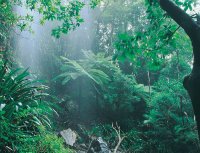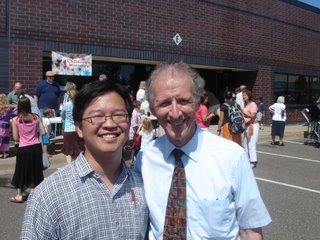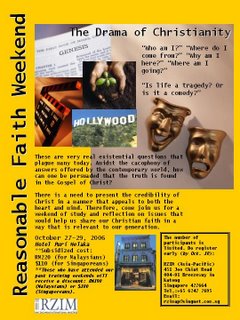 Creation vs. Evolution: What Our Children Need to Know
Creation vs. Evolution: What Our Children Need to KnowBy Nancy Pearcey
A few months ago, President Bush sparked an outpouring of media ink by saying he favored a balanced approach to teaching evolution in public schools. "Both sides should be properly taught," he said, "so people can understand what the debate is about." But homeschooling families have been way ahead of the curve in teaching their children about the debate over Darwin. They were among the first to realize that far more is at stake than simply science -- that when naturalistic evolution is taught in science textbooks, that will lead to a naturalistic view of the human person taught in sociology textbooks, history textbooks, family life textbooks, and all the rest of the curriculum. As a leader of the Intelligent Design movement once said, "A naturalistic definition of science has the effect of indoctrinating students into a naturalistic worldview."
Precisely. Whatever a culture adopts as its creation story shapes everything else.
Yet even today, many Christians fail to recognize this connection. As Francis Schaeffer once said, Christians often see things in "bits and pieces," opposing individual issues like family breakdown, abortion, and immoral entertainment, but failing to see the big picture that connects all the dots. We need to realize, Schaeffer said, that all these forms of cultural dissolution have "come about due to a shift in worldview . . . . to a worldview based on the idea that the final reality is impersonal matter or energy shaped into its current form by impersonal chance."
In other words, long before there was an Intelligent Design movement, Schaeffer realized that everything hangs on a culture’s view of origins. If you start with impersonal forces operating by chance -- naturalistic evolution -- then over time you will end up with naturalism in moral, social, and political philosophy. This is the big picture we need to teach our children to see.
But where to begin? The first step, of course, is to ground them thoroughly in the scientific data. Many books offer a good overview of the arguments, but my experience is that parents often come away with a general idea, yet still don’t feel equipped to teach. My approach here will be to focus on the heart of the evolution controversy -- the origin of life -- and to describe the most recent and compelling evidence in sufficient detail that homeschooling parents will be able to rephrase it in their own words and use it immediately with their children. I will springboard from there to track the far-flung cultural implications of evolution in the next article in this series.
Little Green Men
The heart of design theory is the claim that design can be empirically detected. When you think about it, this is something we do all the time in ordinary life. We distinguish readily between the products of nature and the products of intelligence. Imagine you are walking on the beach, admiring the lovely pattern of the ripples. Yet you know that ripples are nothing more than the effect of wind on waves.
Then suppose you come across a sand castle. Do you assume it was created by the wind and waves as well? Why not? The material constituents of the castle are nothing but sand, mud, and water, just like the ripples all around it. But we intuitively recognize that those starting materials have a different kind of order imposed upon them. Design theory merely formalizes this ordinary intuition.
Critics say the concept of design does not belong in science. But several areas of science already deal with the detection of design. Back in 1967, I read a newspaper headline announcing that astronomers may have discovered radio messages coming from outer space. They dubbed the signals "LGM" to signify "Little Green Men." Later, however, they realized that the radio pulses were coming in a regular, recurring pattern like the flashing of a lighthouse, not an irregular pattern like the sequence of letters in a message. What they had discovered were not aliens but pulsars -- rotating stars.
Today astronomers involved in the search for extraterrestrial intelligence have worked out extensive criteria for recognizing if a radio signal is an encoded message or if it is just a natural phenomenon, like a pulsar. In other words, they have criteria for distinguishing between products of design and products of natural causes.
In the same way, archeologists have worked out criteria for determining when a stone has the distinctive chip marks of a primitive tool (design), and when its shape is simply the result of weathering. Detectives are trained to distinguish murder (design) from death by natural causes. Insurance companies have steps for deciding whether a fire was intentional, a case of arson (design), or just an accident. Cryptologists have procedures to determine whether a set of symbols is a secret message (design) or merely a random sequence. The point is that many branches of science already deal with the detection of design. The claim of design theory is that it can be applied to nature as well.
Who Wrote the Genetic Code?
The clearest example is the origin of life. A few years ago, when scientists announced that they had decoded the human genome, there was tremendous publicity and even a White House ceremony. All the ceremonial language at the time stressed the analogy between DNA and a written language. The director of the National Human Genome Research Institute, Dr. Francis Collins, an evangelical Christian, said: "We have caught the first glimpses of our instruction book, previously known only to God." Then-President Clinton resorted to God talk as well, saying, "Today we are learning the language in which God created life."
These are actually very apt analogies. DNA is built up of 4 chemical "letters" that are combined in various sequences to spell out a message, a code. The DNA in each cell of your body packs in more information than the entire 30 volumes of the Encyclopedia Britannica. The result is that the origin of life now has been recast as the question of the origin of complex biological information.
In ordinary life, when we encounter a message we have no doubt where it came from: We know that only intelligent agents, not natural processes, produce messages. When a friend of mine took a ship up the West Coast to Canada, he was greeted by a colorful display of flowers spelling out "Welcome to Victoria" - a guarantee that the seeds were not blown there randomly by the wind.
An amusing episode took place shortly after September 11 in Palm Beach, Florida. A minor panic broke out when residents spied a cropduster flying overhead, using skywriting to spell out: "God is great." People were afraid that the pilot might be a terrorist praising Allah, and they called the police. But it turned out that the pilot was a Christian, who periodically uses his skywriting skills to send inspirational messages. (He just didn't realize how bad his timing was!)
The point is that when you see a message, a language, you conclude immediately that it is not the product of natural causes. When the citizens of Palm Beach saw fluffy white shapes that looked like letters in the sky, they did not for a moment start discussing interesting patterns of water condensation. They correctly inferred that it was product of an intelligent agent.
The Marks of Design
This kind of reasoning is intuitive -- it seems natural to the human mind. But how do we make it logically and scientifically rigorous? By distinguishing between three types of events: Some events are random, happening by chance. Other events are regular and predictable, and can be formulated in natural laws. Still others are the result of design -- things like houses, cars, computers, and books.
We can illustrate these three options in origin-of-life theories by using the analogy of Scrabble letters. Just as in a language, it is the sequence of the chemical letters in DNA that makes for biological function, so the question is how to explain the origin of that sequence.
CHANCE: The older view of life's origin was that the building blocks arose by chance. But today, chance theories have been rejected. Why? Because in principle, chance does not produce complex information.
Imagine that you put on a blindfold and line up a string of Scrabble letters without looking. Are the letters going to spell out an intelligible pattern? No. What you get is a random sequence. By sheer chance you might get a few short words like "and" or "the," but you will not get Shakespeare's Hamlet. Chance events do not give rise to complex, specified information.
LAW: The second possibility is the most common view among scientists today -- that life arose by natural forces within the constituents of matter itself. Life arises automatically whenever the right conditions hold. Does this explain the sequence in DNA? The answer, again, is No. Why not? Because lawful events act in regular, predictable, repeatable patterns.
In our Scrabble example, the analogy to laws of nature would be that this time you decide to follow certain rules. The rule says, every time you have an S, it's followed by a C, which is followed by an R, then an A, a double B, an L, and an E. The result is that every time you start with S, you get SCRABBLE, SCRABBLE, SCRABBLE. Obviously if you had an alphabet that followed rules like that, you could spell only a few words -- and you could not convey very much information.
The reason a real alphabet works so well is precisely that the letters are not governed by rules. If you know a word begins with a "T," can you predict what the next letter will be? No. It could be virtually any letter. With a few exceptions (q is always followed by u), the letters can be combined and recombined in an almost infinite variety of ways. That's what makes an alphabet capable of conveying vast quantities of information.
The same principle holds with the chemical "letters" in DNA. And if there were laws governing the sequences in DNA, then it would not be able to store very much information. This is backed up by experiments, which show that, as a factual matter, there are no laws governing how the letters combine.
DESIGN: The hallmark of design is an irregular sequence that fits a prescribed pattern. In Shakespeare's Hamlet, the letters are irregular (they do not repeat the same pattern over and over, as in the SCRABBLE example). The reason they function to communicate is that they fit the prescribed pattern of the English language. The technical term for this is "specified complexity," and it's the kind of order we see in books, magazines, and Scrabble games.
The most popular analogy, however, is a computer -- the DNA molecule itself is the hardware and the message it stores and conveys is the software. That's why biologist Richard Dawkins can say, "The machine code of the genes is uncannily computer-like. Apart from differences in jargon, the pages of a molecular biology journal might be interchanged with those of a computer engineering journal."
The Medium Not the Message
The realization that life is about information completely turns older arguments about evolution on their head. Why? Because information is independent of the material medium used to store and transmit it. In a book, the words are printed with ink on paper, but they could also be written with crayon or paint or chalk, or even scratched into sand with a stick. The message remains the same, no matter what you use to write it. And the obvious implication is that the message was not created by the matter used to write it.
The words in a book were not created by chemical forces within the ink and paper. If you see a message on a chalkboard -- "Science Test Today!" -- you do not think it arose from the chemical properties of calcium carbonate. What does this mean for the origin of life? It means the message in DNA was not created by the chemical forces within the molecule itself.
This explains why all the experiments to create life have failed - because they all try to build a living form from the bottom up, by assembling the right materials. But the material medium does not write the message. As astrophysicist Paul Davies says, "Trying to make life by mixing chemicals in a test tube is like soldering switches and wires in an attempt to produce Windows 98. It won't work because it addresses the problem at the wrong conceptual level."
This is a devastating critique. To suggest that matter could give rise to life is not just mistaken; it addresses the question "at the wrong conceptual level." It is beginning to look like the best key to interpreting the organic world is not natural selection but John 1:1, "In the beginning was the Word," the Logos -- language, information.
Philosophy, Not Facts
Why don't these arguments get a hearing in the typical science textbook? The answer is that science has been redefined as applied naturalism or materialism. Consider this quotation from Richard Dawkins: "Even if there were no actual evidence in favor of the Darwinian theory . . . we should still be justified in preferring it over all rival theories." Why? Because it is naturalistic.
In a letter published in Nature, another scientist says the same thing from the opposite direction: "Even if all the data point to an intelligent designer, such an hypothesis is excluded from science because it is not naturalistic."
Let that sink in for a moment. Even if there is no evidence for Darwinism, and if all the data point to a designer, still that theory would not be permissible in science. Obviously, it is not ultimately a matter of evidence at all. What this tells us is that science itself has been redefined as applied naturalistic philosophy, so that only naturalistic theories are even considered. That's why we have to deal with the issue on two levels - not only the scientific evidence, but also the philosophy. The next article in this series will give an eye-opening description of the pervasive impact of Darwinism on virtually every aspect of American culture.
The original article is here.


















